The European Committee of the Regions (CoR) members adopted today by a large majority the opinion on a European Strategy for Plastics in a Circular Economy, drafted by André Van de Nadort, mayor of Westellingwerf (PES/Netherlands). Commenting on the final vote, the rapporteur said: "Oceans are full of plastics, the streets of our cities are full of plastics and we even have plastics on our plates and in our bodies. We consider the European Strategy for Plastics in a Circular Economy and Commission's proposal to ban certain single-use plastics items as important first steps. But we need ambitious and sustainable solutions to move towards a circular economy where we would use less plastics and better plastics, and where we would have better collection and recycling. In order to go truly circular, we also urgently need clear market incentives for re-use and recycled materials".
The CoR opinion gives key recommendations, including:
-
involving local and regional authorities - responsible for waste management and environmental protection - in decisions regarding waste prevention, collection, transport, disposal and cleaning up litter, and encouraging deep behavioural change by building better awareness about waste, littering and recycling among their citizens.
-
taking into account the voice of specific communities and regions of the EU, i.e. Outermost Regions, river communities, islands, coastal and harbour communities, that are on the frontline in the fight against marine litter, to find positive and practically applicable solutions.
-
asking the European Commission and the EU Member States, during their negotiations on the next MFF, to fully explore options for an increase in EU funding for the circular plastics economy, to promote innovation and investment that can promote social and behavioural changes.
-
promoting the participation of local and regional authorities in events such as the "Let's Clean Up Europe" campaign and the European Week for Waste Reduction and encourages cities and regions to come up with additional initiatives and exploring the possibilities of involving volunteers through the European Solidarity Corps.
-
calling for a ban on oxo-degradable plastics and intentionally added microplastics in all products where they are not necessary from a human health point of view, and further research into the effects of microplastics on animal and human health.
-
highlighting the urgent need for a better design of plastics (eco-design), taking into improving the possibilities for future separate collection, sorting and recycling of plastics and plastic products.
-
urging caution with regard to the current generation of 'biodegradable' plastic which does not represent an answer to the problem of plastic litter, as it often does not degrade in a natural environment or only after very long time. Thus the term 'biodegradable' can mislead consumers.
"Production levels of plastics will double in the next 20 years, bringing even more tonnes of plastics in our oceans. This is what we need to do for our citizens' health and our planet's health too. We need to act now to make the Sustainable Development Goals a reality, and we have to imagine eventually a future without fossil-fuel based plastics," concluded the rapporteur André van de Nadort.
